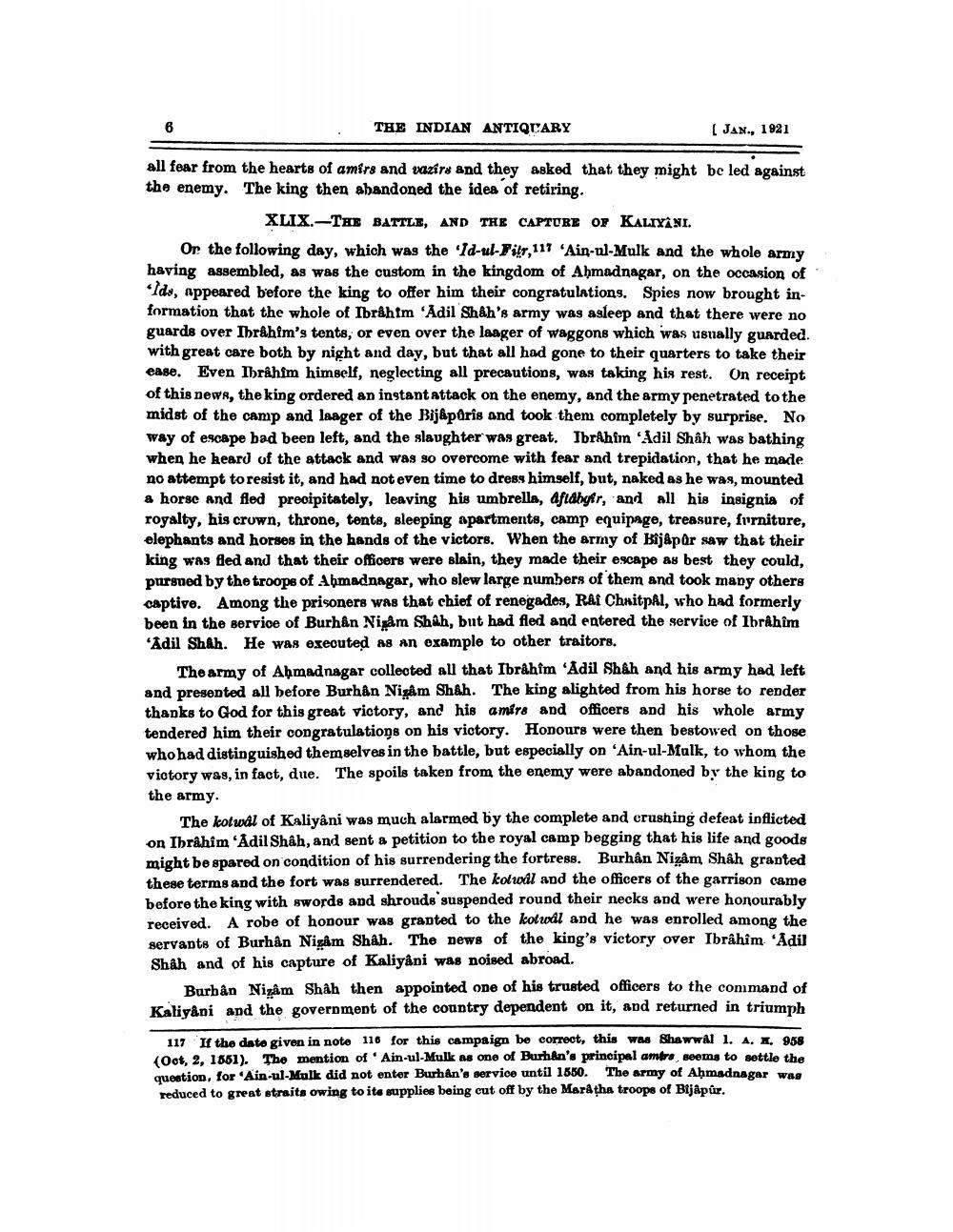________________
6
THE INDIAN ANTIQUARY
[JAN., 1921
all fear from the hearts of amirs and vazirs and they asked that they might be led against the enemy. The king then abandoned the idea of retiring.
XLIX. THE BATTLE, AND THE CAPTURE OF KALIYANI.
Or the following day, which was the 'Id-ul-Fitr,117 'Ain-ul-Mulk and the whole army having assembled, as was the custom in the kingdom of Ahmadnagar, on the occasion of Ids, appeared before the king to offer him their congratulations. Spies now brought information that the whole of Ibrâhtm 'Adil Shah's army was asleep and that there were no guards over Ibrahim's tents, or even over the laager of waggons which was usually guarded. with great care both by night and day, but that all had gone to their quarters to take their ease. Even Ibrâhîm himself, neglecting all precautions, was taking his rest. On receipt of this news, the king ordered an instant attack on the enemy, and the army penetrated to the midst of the camp and laager of the Bijapûrîs and took them completely by surprise. No way of escape had been left, and the slaughter was great. Ibrâhîm 'Adil Shah was bathing when he heard of the attack and was so overcome with fear and trepidation, that he made no attempt to resist it, and had not even time to dress himself, but, naked as he was, mounted a horse and fled precipitately, leaving his umbrella, aftabgir, and all his insignia of royalty, his crown, throne, tents, sleeping apartments, camp equipage, treasure, furniture, elephants and horses in the hands of the victors. When the army of Bijapur saw that their king was fled and that their officers were slain, they made their escape as best they could, pursued by the troops of Ahmadnagar, who slew large numbers of them and took many others captive. Among the prisoners was that chief of renegades, Râî Chaitpâl, who had formerly been in the service of Burhân Nigam Shah, but had fled and entered the service of Ibrâhîm 'Adil Shah. He was executed as an example to other traitors.
The army of Ahmadnagar collected all that Ibrâhîm 'Adil Shah and his army had left and presented all before Burhân Nigâm Shah. The king alighted from his horse to render thanks to God for this great victory, and his amire and officers and his whole army tendered him their congratulations on his victory. Honours were then bestowed on those who had distinguished themselves in the battle, but especially on 'Ain-ul-Mulk, to whom the victory was, in fact, due. The spoils taken from the enemy were abandoned by the king to the army.
The kotwal of Kaliyâni was much alarmed by the complete and crushing defeat inflicted on Ibrâhîm 'Adil Shah, and sent a petition to the royal camp begging that his life and goods might be spared on condition of his surrendering the fortress. Burhân Nizam Shah granted these terms and the fort was surrendered. The kotwal and the officers of the garrison came before the king with swords and shrouds suspended round their necks and were honourably received. A robe of honour was granted to the kotwal and he was enrolled among the servants of Burhân Nigâm Shâh. The news of the king's victory over Ibrâhîm 'Adil Shah and of his capture of Kaliyâni was noised abroad.
Burhan Nizam Shah then appointed one of his trusted officers to the command of Kaliyani and the government of the country dependent on it, and returned in triumph
117 If the date given in note 116 for this campaign be correct, this was Shawwal 1. A. x. 958 (Oct, 2, 1551). The mention of Ain-ul-Mulk as one of Burhan's principal amers, seems to settle the question, for 'Ain-ul-Mulk did not enter Burhan's service until 1550. The army of Ahmadnagar was reduced to great straits owing to its supplies being cut off by the Maratha troops of Bijapur.




